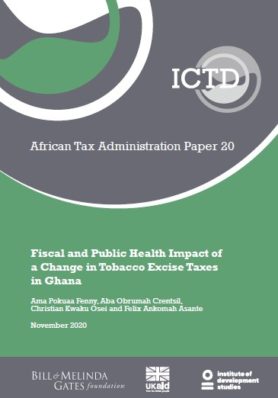African Tax Administration Paper 20
This paper predicts the fiscal and public health outcomes from a change in the excise tax structure for cigarettes in Ghana. More than 5,000 people are killed by diseases caused by tobacco every year in Ghana (Tobacco Atlas 2018). Currently the country has a unitary tax administration approach, with a uniform ad valorem tax structure on all excisable products, including tobacco. However, the ECOWAS directive on tobacco control, in line with the WHO Framework Convention on Tobacco Control (WHO 2003), recommends a simple tax structure – using a mixed excise system with a minimum specific tax floor to overcome the limitations of an ad valorem system on tobacco products, especially cigarettes. The study therefore simulates mixed tax policy interventions, and assesses their effect on government revenue and public health relative to the current ad valorem tax system. Primary data collection of tobacco prices in three geographical zones of the country was conducted in February 2020, across both rural and urban localities. This was supported with secondary data from national and international databases. Based on the assumption that Ghana adopts a mixed tax structure, the simulation shows that, if the government imposes a specific excise tax of GH₵4.00 (US$0.80) per pack in addition to the current ad valorem rate of 175 per cent of the CIF value, the average retail price of a cigarette pack would increase by 128 per cent, cigarette consumption decrease by 27 per cent, tobacco excise tax revenue increase by 627 per cent, and overall tobacco-related government tax revenue increase by 201 per cent. Additionally, there would be significant declines in smoking prevalence (3.3%), smoking intensity (1,448 cigarettes per year), and 3,526 premature smoking-related deaths would be avoided. The paper advocates for a strong tax administration and technical capacity, with continuous commitment by the government to adjust the tax rate in line with the rate of inflation and per capita income growth.
